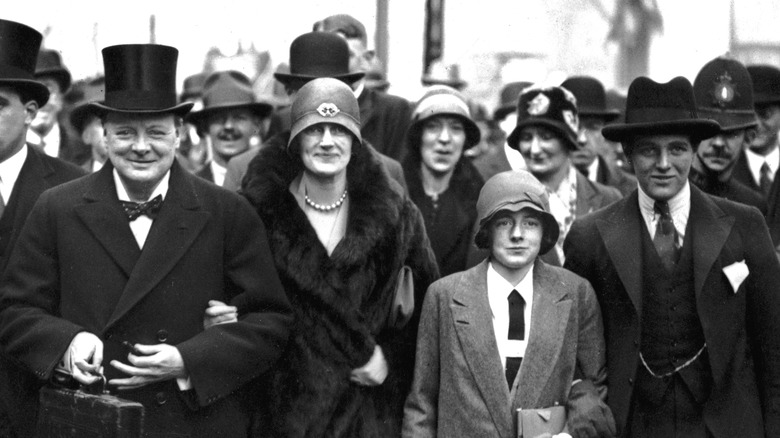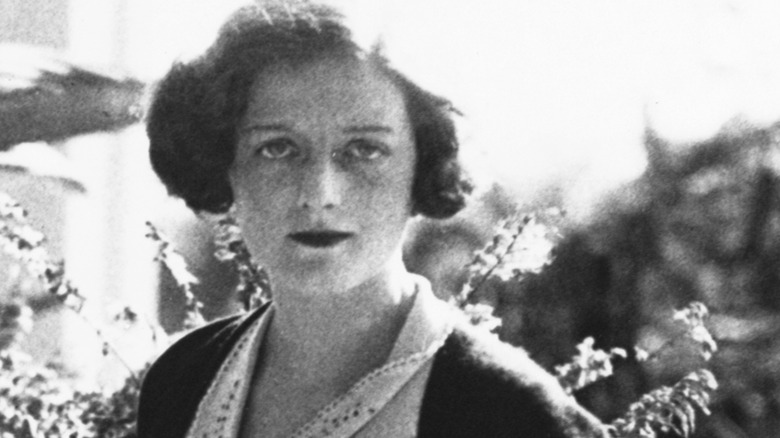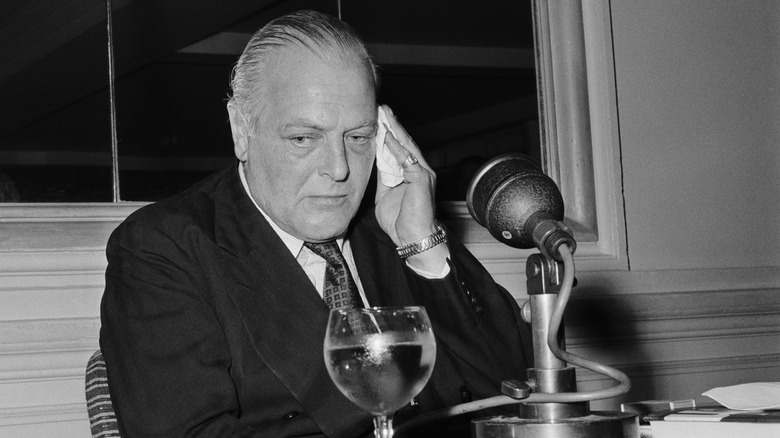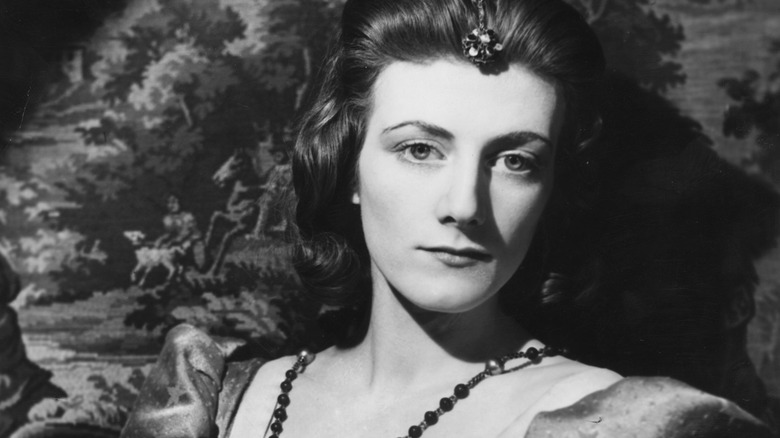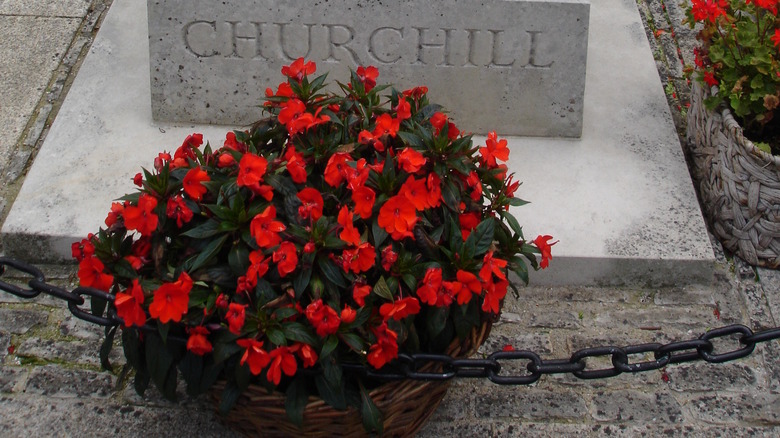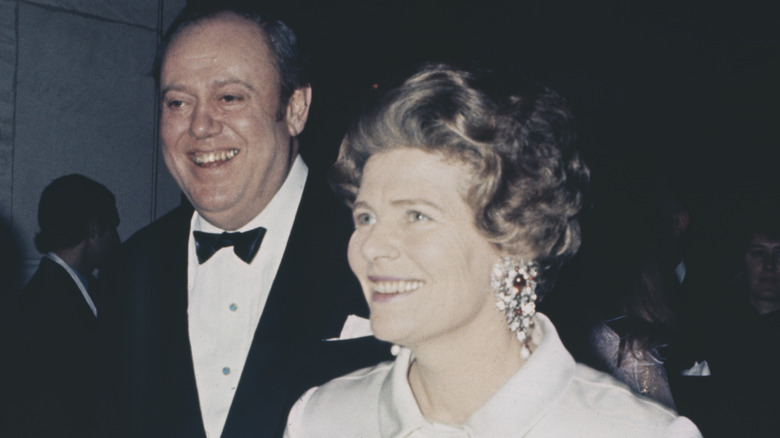What Happened To Winston Churchill's Kids?
He was stubborn, mercurial, and prejudiced even for his time, and his record as a peacetime statesman and leader is spotty at best. But Winston Churchill cut a singular figure in British and world history. As Gautam Mukunda argued in Forbes, the very traits that led Churchill so badly astray elsewhere were indispensable in the fight against Nazism. Leading that fight in Western Europe's bleakest moment is the sort of thing that leads posterity to accept a man's many flaws, even when they include unbridled contempt for people attempting to cast off the British empire.
It was the sort of heroic achievement that Churchill's father, Lord Randolph, wouldn't have imagined him capable of. Per Josh Ireland's "Churchill & Son" (via The American Conservative), Lord Randolph was a distant and uninvolved father who only spoke with his son to reprimand him. If he imagined any Churchill at 10 Downing Street, it was himself — Lord Randolph was a champion of Tory democracy and a strong contender for prime minister before he repelled needed allies and died relatively young from complications of syphilis. Churchill's mother wasn't much more attentive to him, writes the Churchill International Society. She had society functions and adultery to occupy her time.
Despite the distance between him and his parents, Churchill revered them and declared their neglect a blessing, though he took a different approach when he became a father. "[He] was an affectionate and devoted parent," the Society reports. But that didn't mean Churchill's children had an easier time navigating life than their father.
Diana Churchill
With his wife Clementine, Winston Churchill had five children — a son and four daughters. The eldest, Diana, was born on July 11, 1909 (per John Pearson's "The Private Lives of Winston Churchill"). As she came into the world, Churchill proudly told David Lloyd George, "She is the image of me." According to the International Churchill Society, Churchill was one to spoil his children, while Clementine acted as disciplinarian. Though both of them sought to be more involved than their own parents had been, Churchill's career and Clementine's devotion to him still came first, and the series of nannies who attended to Diane and her siblings had a mischievous brood on their hands.
When she wasn't acting out, Diane was a shy child, a trait that became more pronounced as she grew. Per Rachel Trethewey's "The Churchill Sisters" (via The History Reader), she was closer to her father than her mother, who often inadvertently wounded her eldest daughter with sharp criticism. As an adult, Diana often accompanied and cheered up her father when Clementine was indisposed, and she shared his interest in politics. Churchill doted on her, but he never saw Diana as a potential heir to his political career on account of her sex.
While affectionate with her father, the introverted and sensitive Diana worried both her parents, according to the Churchill Archives Center. Both her marriages ended in divorce, though her union with Duncan Sandys (a devoted Churchill supporter) bore three children. She experienced a series of nervous breakdowns, through which she said her father was her greatest supporter. Diana would predecease Churchill, dying from suicide in 1963. She was 54.
Randolph Churchill
In "Churchill & Son," Josh Ireland imagines Winston Churchill looking at his only son, Randolph, and seeing all the best and worst of his own character. In Ireland's judgment, and that of other observers, the latter won out in Randolph. Born in 1911, he was every bit as misbehaved as his big sister had been. But where Diana developed into a nervous young woman, Randolph became, in John Pearson's estimation, a "monster" who alternately protected and terrorized the other children in the family. Ireland writes that he would confess to misdeeds he hadn't done just to show how little punishment meant to him.
Churchill was as indulgent with Randolph as he was with Diana and determined to make his boy a statesman in his mold. Randolph did serve in Parliament, though it took him four tries to get elected, and his time as an MP overlapped with his service as an intelligence officer during World War II. But his cruelty, failed marriages, and odious personality alienated even his father. According to the Daily Mail, Churchill allegedly once said of his son, "I love Randolph, but I don't like him."
Randolph's time in Parliament didn't extend past the war. Still unpleasant and reckless with money, he did demonstrate a gift for writing that he turned into a successful career as a journalist and author. Among his literary accomplishments were two volumes in his father's biography — for all their strife, he idolized his father. Per Jonathan Aitken's "Heroes and Contemporaries," Randolph was still working on the third volume when he died in 1968, aged 57.
Sarah Millicent Hermione Touchet-Jesson
There have been two women of note in the Churchill family named Sarah. The first, the Duchess of Marlborough, used her window of influence at court to advance the Whig agenda during the reign of Queen Anne. The second was the daughter Winston Churchill nicknamed "Mule" for her stubborn streak, according to John Pearson's "The Private Lives of Winston Churchill." Born in 1914, staffer Jane Portal said Sarah may have been Churchill's favorite child (via The Churchill Project). Affection didn't stop him from trying to prevent her first marriage or from squabbling with her over the years. But even as he fought with his middle child, Churchill admired her willfulness (per UPI).
One of Sarah's choices Churchill didn't object to was her profession. Both her parents were content for her to be an actress as long as she applied herself, and she had talent enough to take her to the West End, Broadway, and Hollywood in turn. Her most enduring work as an actress came in 1951 when she performed opposite Fred Astaire in "Royal Wedding." Ultimately, Sarah showed her patriotism by putting her career on hold during World War II to serve in the Women's Auxiliary Air Force, and she accompanied her father to the Yalta Conference.
Outgoing and popular, Sarah — who friends feared was prone to self-destruction — struggled to find personal happiness. Her heavy drinking frequently got her in trouble with the law, and she lost two husbands to suicide and a heart attack, respectively. Sarah died herself in 1982, at 67, after a long struggle with an unspecified internal condition.
Marigold Churchill
The fourth of Winston Churchill's children was born on November 15, 1918, just after the armistice ended World War I. Per Martin Gilbert's "Churchill: A Life," she was named Marigold and nicknamed "Duckadilly." Churchill considered her an affectionate and attentive child who checked in on him every morning. "[She] takes a great interest in everything that is said to her or shown to her," he wrote his wife Clementine on Valentine's Day 1921. But that August, Marigold fell ill with meningitis. She died of sepsis on the 23rd. She was a few months shy of her 3rd birthday.
Marigold's heartbroken parents initially had her buried in London's Kensal Green Cemetery. But as other members of her family died, they were buried at St. Martin's Church in Bladon, and Marigold's last surviving sibling, Mary Soames, sought to have her relocated to join the rest of the family. Soames herself died in 2014, and the legal process to have Marigold moved was long and complex. But in 2020, she was reinterred with her family at St Martin's, where she shares a headstone with her older sister Sarah. Her headstone in Kensal Green remains as a listed monument.
[Featured image by LordHarris via Wikimedia Commons | Cropped and scaled]
Mary Soames
The youngest of Winston Churchill's children is widely held to have had the happiest life. Mary Churchill, later Mary Soames after her marriage, was born on September 15, 1922. Much younger than all her surviving siblings, she was primarily raised at the Churchills' country home of Chartwell, with her mother's cousin Maryott Whyte as her primary caregiver. Per her New York Times obituary, her upbringing was full of Arcadian bliss and colorful visitors. As a teenager, she began taking annual skiing trips with her mother, and the two of them remained close.
Without telling her father, Mary enlisted in the Auxiliary Territorial Service during World War II and saw action in London and the continent. She later traveled with her father to the Potsdam conference. Churchill allegedly once hoped to arrange Mary's marriage to Prince Charles, Count of Flanders and regent of Belgium, but she instead married Christopher Soames in 1947. She supported her husband in his long career as a politician and diplomat. They had five children.
Having never seriously pursued writing before, Mary launched into a literary career in 1979 with a biography of her mother. She went on to write several more books about her family, the last being "A Daughter's Tale" in 2011. Mary also served controversially as chairman of the board of trustees for the Royal National Theatre and patronized various organizations connected to her family's legacy. She died in 2014 at age 91.
